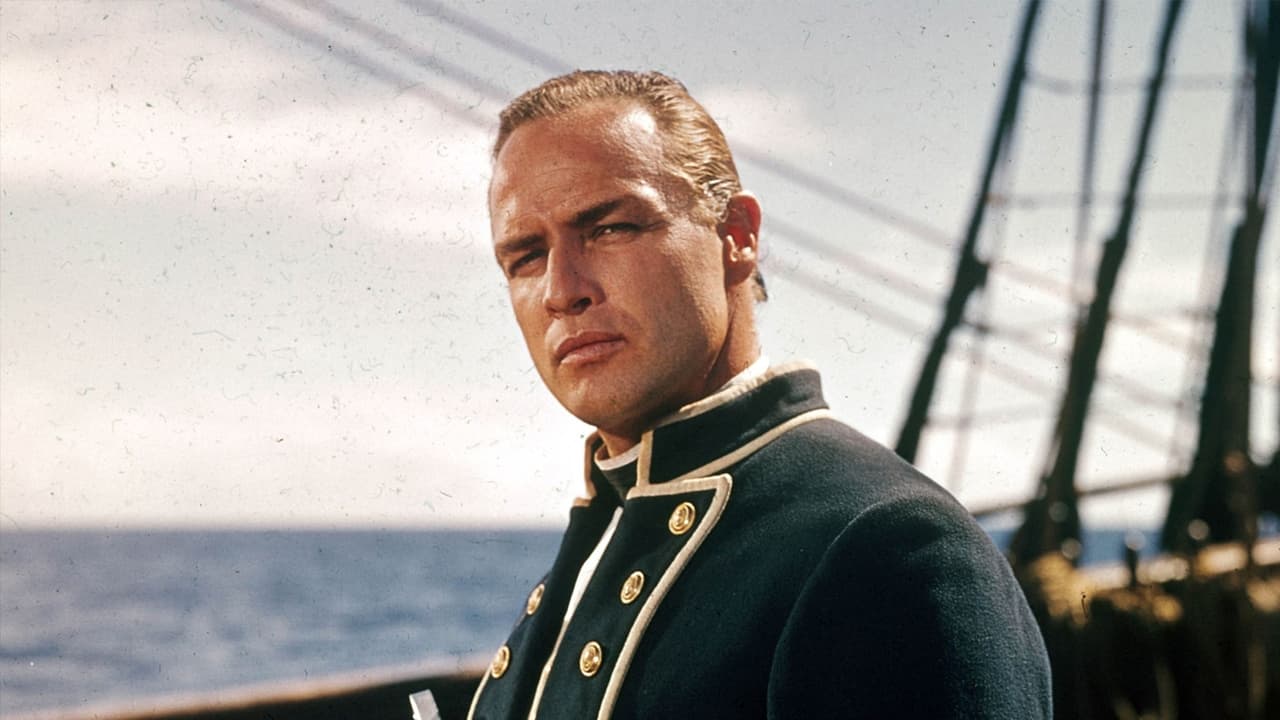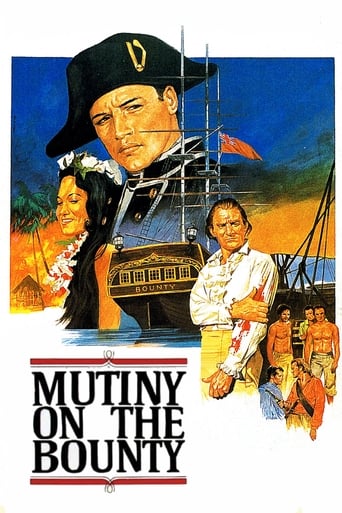

Leonard Maltin famously gives this movie a mere two-and-a-half stars (out of four) and says Brando is "all wrong" for the role of Fletcher Christian. Regarding the rating - IMO it's a three-and-a-half star film. Regarding Brando - the idea that he's "all wrong" is a useless comment not worthy of Maltin.What the heck does "all wrong" mean, anyway? "All wrong" seems to suggest that the reviewer (Maltin or one of his team members) knew the real Christian and that Brando isn't like Christian at all. I find it unlikely that Maltin knew the real Christian. No one alive today knew the real Christian. Furthermore, very little is known about the man. Brando in this film creates a fictional Christian (I emphasize "fictional") who seems pretty damn real and convincing to me if viewed as fictional.In any case, this is a Hollywood movie and thus owes limited allegiance to historical fact. The first priority of a Hollywood movie about the past is to entertain people who buy tickets. It's helpful, perhaps, if historical accuracy can be slotted into the affair, but this is not, in my view, a first priority.Perhaps Maltin and his team read a biography of Christian and find Brando radically dissimilar from the portrait of the mutineer presented in the book. I would like to know the name of this book; I rather think that citing a source, in this case, is justified.Is Maltin perhaps saying that Brando is "all wrong" for the role in comparison to Clark Gable's performance 20-plus years earlier? If so, this is truly laughable, for two reasons: (a) Gable's performance is wooden and (b) The world changed from 1939 to 1962; Brando's performance reflects some of this change, as any actor's performance reflects the times he or she lives in.So, yeah, I'm beating up on Maltin a little bit here. I think his review of "Mutiny on the Bounty" lacks foundation and thus is weak. Dislike the movie if you must, Leonard, but give some coherent reasons.Brando is excellent in this movie in my opinion. The entire cast is quite good. The story is bold and dramatic. The score is great and the photography is spectacular.I myself have zero interest in all the problems the production experienced. I am interested in what's on the screen - and what's on the screen is very damn good.
... View MoreMutiny on the Bounty was the Pirates of the Caribbean or Kong Skull Island of the 1960s. This was the big budget spectacle of that era. The spectacle was not limited to the special effects, cheap thrills or long shots of grand vistas like in the mediocre films of today. Watching and listening to Trevor Howard's glorious acting and Marlon Brando's body language and the two thespians running circles around each other is a part of the package. Actors like them do not exist anymore.A British expedition to gather breadfruit from Tahiti runs into trouble due to the extreme cruelty of Captain Bligh (played by Trevor Howard). But Christian Fletcher (Brando) keeps his own and the crew's temper at bay until they reach Tahiti. But things fall apart on the way back and the crew led by Christian stages a mutiny against Captain Fletcher.The scenes in the Tahitian island are worth their weight in gold. The mating dance that the Tahitian women put up for the new arrivals was sexy as hell. I loved the great overhead pan shots that move from the dancing Tahitian women to the new arrivals. The fishing scene where the Tahitian women are gathered in a circle and the ship's crew runs at them was beautiful.Parts of the film were directed by the great Carol Reed before he left due to differences with Brando. I think Brando got Kubrick fired from One Eyed Jacks.Trevor Howard upstages Brando in some scenes. He certainly has some of the best dialogs. But Brando's brooding presence and body language cannot be ignored. He looked like a petulant child in the scene where he finally takes on Captain Bligh. Tarita who later became Brando's real life wife was very sexy. Hugh Griffith and Richard Harris played two of the hapless sailors who are constantly punished by Captain Bligh. They might have had too much make up on. Everyone seemed a little over made up at times. And I could tell that some of the scenes were shot in a studio with fake sets.But I really enjoyed the film though reviews and trivia on IMDb suggest that the film wasn't too well received when it first came out. People had issues with Brando's British accent. It is really long at almost three hours. But the frequent and beautiful shots of the sea interwoven into the tense drama makes this one a real classic for me. The film looks really good on Blu-ray.(8/10)
... View MoreThere are times when I wonder why Hollywood bothers to do remakes of classic movies. That thought did occur to me as I prepared to watch this 1962 remake of the 1935 classic. Although it wasn't without its problems, I fell in love with the '35 version when I first saw it as a teenager, and I confess that I had my doubts about taking in any of the remakes of the story. Both films suffer from the real curse of any movie based on true events - they take way too many liberties with history. Bligh's court-martial, as far as I know, didn't admonish him after acquitting him (in fact, he eventually rose to the rank of Admiral.) Christian's desire to return to England and his death after the burning of the Bounty are pure fantasy. One wonders why they were included in this movie, since they didn't add anything particularly noteworthy to the story. But historical inaccuracies are to be expected in any historical epic, so one shouldn't become too consumed by them. The basics are here - the voyage of the Bounty to Tahiti to collect breadfruit, the mutiny led by Christian and the escape of the mutineers to Pitcairn Island.Visually, this movie is stunning, which is probably due at least in part to the fact that unlike the '35 version it's obviously filmed in colour, which gives an entirely different feel to the scenes shot in Tahiti especially. There's also the fact that the studio went to the trouble and expense of essentially recreating the Bounty - building an actual replica ship, which also gave a more realistic feel to this production. (The replica sank during Hurricane Sandy in 2012.) Technically, as would be expected, the special effects are better in this movie. My reactions to the cast are interesting. I thought that this film offered a much more nuanced view of Bligh and Christian than the '35 movie. Here, Bligh comes across as less pompous and sadistic - although certainly a strict and perhaps extreme disciplinarian, and Christian seems more fleshed out - less noble, perhaps, more reluctant to act against Bligh and much more beset by doubts. Trevor Howard's performance as Bligh was good, although I have to confess that he does not replace Charles Laughton in my mind as Captain Bligh - Laughton's will still be the face I associate with the man, and Howard was a few years too old to play the part. Bligh was 33 when he took command of the Bounty; Howard was almost 50 when this was made. I liked Brando as Christian. I know that a lot of people didn't, and his performance was perceived as one reason (perhaps the main reason) that the movie wasn't well received. But I liked him - although Brando was also much older than Fletcher Christian. I actually thought he was better than Clark Gable in 1935. Gable, to me, never really captured the part of a British naval officer, and in some ways never seemed to try very much. Brando, on the other hand, did seem to try to get into the mind of the character and I thought he worked well. That puts me in the minority, but I thought his performance was fine. The supporting cast (the most notable being Richard Harris as Seaman Mills) held their own, but as with any adaptation of the story, those who play Bligh and Christian will make or break it.I appreciated the attempt to inject a little more humour into the story than the earlier version. A lot of that humour revolved around the Bounty's time in Tahiti and what the British perceived as the relatively "loose" moral standards of the Tahitian women. The scene between Howard and Brando where Bligh is trying to order Christian to return to Tahiti to make love to the Tahitian king's daughter (because the Tahitians were insulted that Bligh ordered an end to their encounter when he found them on the island, perceiving that as an insulting suggestion that Englishmen were too good for Tahitian women) - with Christian feigning ignorance of what he meant, forcing Bligh to finally give him a direct order to do the deed, so to speak - had me smiling.This movie was too long. The runtime of almost 3 hours could have easily been shaved by probably close to a third without much being lost. It was a very expensive movie by the standards of early 1962, and in fact, given its production costs and relatively low box office receipts, it's probably fair to consider this a flop. Judging this movie on its merits, though, I'd say that would be inaccurate. I'd personally say that it's not as good as the 1935 version of the story - but it's pretty close. I think it was a pretty good remake - perhaps one of the better remakes of classic films that I've seen - and it probably deserved to be regarded more highly by the critics of its day - although it's rating of 7.2 here (as of writing) suggests that this film has been better received by successor generations than by its own generation. (8/10)
... View MoreNot so much directed as staged by the legendary Lewis Milestone, MUTINY ON THE BOUNTY boasts a great performance by Trevor Howard and a decidedly outré one by Marlon Brando. Based on the true-life mutiny aboard the British warship HMS Bounty, the film is beautifully assembled but ultimately very static. It's as if MGM wanted to get its money's worth in production values at the cost of a truly compelling script. Howard, as the draconian Captain Bligh, never waivers in his demented view of discipline and steals each scene he's in. It's unfortunate that he's not given more scenes allowing the audience to genuinely loathe him. Brando, as a fop faced with making a no-win decision to lead a shipboard rebellion, seems at first completely out-of-sync with the rest of the actors...but eventually his performance works as he's transformed into the only noble character left. Richard Harris adds a lot as Mills and Richard Haydn & Hugh Griffith are also on board. The middle part of the film spends far too much time in Tahiti, thus becoming something of a travelogue as opposed to adding to the storyline.
... View More